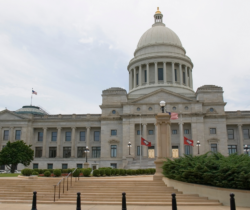
Arkansas is one of a minority of states set to collect extra taxes from residents who receive federal student loan forgiveness announced by President Biden last week. But we don’t have to do that. We can follow the lead of the federal government – and most other states – and choose not to count the loan forgiveness as taxable income.
Last week, the President announced a long-anticipated plan for forgiving some amount of student loan debt for those meeting certain requirements. This plan has many features, but what has received the most attention is that borrowers making less than $125,000 annually will receive up to $10,000 in loan forgiveness or up to $20,000 for borrowers who received a Pell grant.
Loans don’t usually count as taxable income because the expectation is that they will be paid back. However, loans that are forgiven are usually counted as taxable income. Currently, though, student loan forgiveness is tax-free at the federal level because of changes from the American Rescue Plan of 2021.
But in Arkansas, someone who gets any amount of student loan forgiveness will be required to pay state income taxes on that amount. We’re one of 13 states expected to do so. Someone in the top tax bracket who gets $20,000 in loan forgiveness may owe up to $980 in additional state income taxes (based on a top tax rate of 4.9 percent, per legislation passed in the recent special session).
Some state tax codes follow the federal code automatically, but Arkansas has what is known as “selective conformity” to the federal tax code. That means our state Legislature needs to decide if we want to follow along and treat student loan forgiveness as tax-free.
There is plenty of recent precedent for this.
In 2021 the CARES Act excluded forgiven Payroll Protection Program (PPP) loans from taxable income, and our state Legislature decided to follow suit. They also allowed businesses to deduct expenses paid for through forgiven PPP loans, an additional tax benefit that would not apply to student loans.
They could just as easily do so for student loan forgiveness if they choose.
